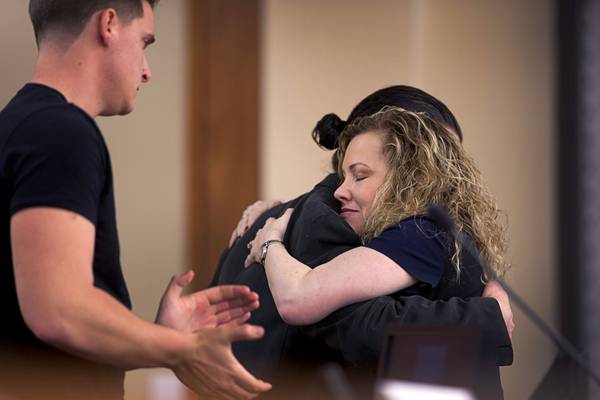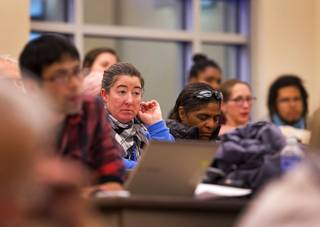In 2009, as a technician for the U.S. Air Force in Kandahar, Afghanistan, Cian Westmoreland embarked on a seemingly nonviolent action. It has come to haunt him. Westmoreland set up a station that relayed data for targeted drone strikes. It was an order that contributed to the deaths of hundreds of civilians, he told a crowd of activists at UNLV’s Boyd School of Law on Wednesday.
“I did a lot of damage with what I did and it was very civil,” Westmoreland said. “The thing that scares me most about war is not necessarily the brutality of it but the civility of it.”
Three whistleblowers including Westmoreland urged the government to reassess its use of armed drones, and called for transparency as well as accountability. The panel coincided with a week of protests at Creech Air Force Base in Indian Springs, about 50 miles outside of Las Vegas. As one of the Air Force’s primary outposts for missions ranging from surveillance to overseas strikes, the air base has drawn its share of protesters in recent years.
A former counterterrorism officer for the Central Intelligence Agency, Christopher Aaron, also played an auxiliary role in drone missions. But he said he felt responsible for the strikes and that the structure of the program enables detachment. There is constant turnover, he said, and responsibility is dispersed.
Westmoreland called this the “fusion of responsibility,” in which the people responsible are separated from the ultimate action.
“I think in systems like this, bad things can happen,” he said.
The Air Force did not respond to an email requesting comment before the panel. The White House earlier this month announced that it would release a report accounting drone casualties.
“We know that not only is greater transparency the right thing to do, it is the best way to maintain the legitimacy of our counterterrorism actions and the broad support of our allies,” President Barack Obama’s counterterrorism and homeland security adviser, Lisa Monaco, said during a speech in early March.
Human rights groups and legal organizations, including the ACLU, have placed pressure on the Obama administration to bring greater accountability to the use and scope of targeted drone strikes.
Multiple speakers Wednesday night criticized the government’s accounting of civilian casualties in drone strikes and said that its recordings vastly undercounted casualties. Many independent reports, including from the Bureau of Investigative Journalism, places civilian casualties in the high hundreds.
“Every time we kill a civilian, it creates hatred in the families,” Westmoreland said. “If they don’t have anywhere else to turn, they are going to turn to radical organizations.”
During his time at the CIA, Aaron said he was based in Afghanistan and Iraq. He said the current use of drone strikes might be effective, by the government’s standards, but had no clearly defined goal and would lead to “perpetual war.”
“We are absolutely sowing the seeds for the next round of people to hate us,” he said about the effect of the drone strikes.
The three-hour panel featured two lawyers and a former military chaplain. Jesselyn Radack, who defends whistleblowers and served as a legal adviser to Edward Snowden, stressed the pressures whistleblowers face, from retaliation to financial difficulty. But she also underscored their importance, noting their role in revealing prisoner abuse at Abu Ghraib and torture practices.
Several audience members — many of them in the Veterans for Peace — were expected to complete a week of protesting in front of Creech Thursday and Friday. Westmoreland offered the protesters advice, saying inflammatory tactics can be counterproductive.
“These are people,” he said of those working at the base, encouraging protesters to be supportive. “They feel stuck.”



Join the Discussion:
Check this out for a full explanation of our conversion to the LiveFyre commenting system and instructions on how to sign up for an account.
Full comments policy